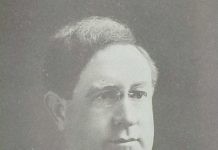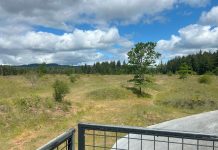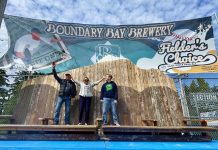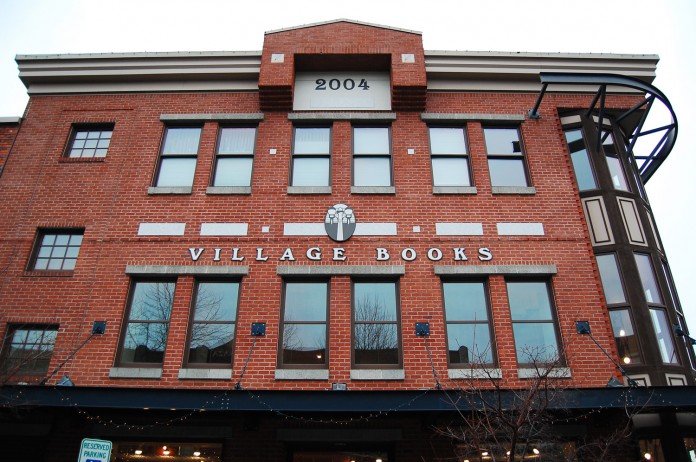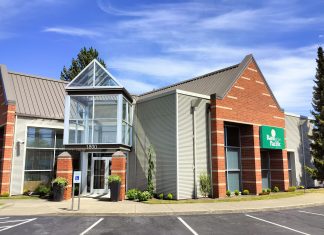Submitted by Village Books
Summer is on the horizon, which means the longest day of the year is fast approaching. Get your reading list summer ready with more than 20 author talks at Village Books. Just in time for the season, David George Gordon’s guide to finding Sasquatch is a great read to add to any outdoor adventure seeker’s backpack, and Paul Thompson’s book “From Field to Fork: Food Ethics for Everyone” provides insight into adding some ethics to your summer spread.
Saturday, May 30, 4:00 p.m.
Sheldon Solomon, “The Worm at the Core: On the Role of Death in Life”
Death is the worm at the core of the human condition. The awareness that we humans will die has a profound and pervasive effect on our thoughts, feelings, and behaviors in almost every domain of human life — whether we are conscious of it or not. More than one hundred years ago, the American philosopher William James dubbed the knowledge that we must die “the worm at the core” of the human condition. In 1974, cultural anthropologist Ernest Becker won the Pulitzer Prize for his book “The Denial of Death,” arguing that the terror of death has a pervasive effect on human affairs. Now authors Sheldon Solomon, Jeff Greenberg, and Tom Pyszczynski clarify with wide-ranging evidence the many ways the worm at the core guides our thoughts and actions, from the great art we create to the devastating wars we wage.
Sheldon Solomon is Professor of Psychology at Skidmore College. His work with Jeff Greenberg (at the University of Arizona) and Tom Pyszczynski (at the University of Colorado at Colorado Springs) exploring the effects of the uniquely human awareness of death on individual and social behavior has been supported by the National Science Foundation and the Ernest Becker Foundation and was featured in the award winning documentary film “Flight from Death: The Quest for Immortality.”
Wednesday, June 3, 7:00 p.m.
David George Gordon, “The Sasquatch Seeker’s Field Manual”
Whether one uses the term Bigfoot, Sasquatch, or the Abominable Snowman, everyone from professional scientists to citizens has been debating the existence of North America’s most elusive creature for decades. In “The Sasquatch Seeker’s Field Manual,” longtime naturalist David George Gordon suggests that the most interesting question might not be whether Sasquatch exists, but rather how do we best go about looking for proof? From the creature’s physical features and behaviors to its wilderness habitat, Gordon shares an overview of Sasquatch’s role in Native American lore through to more recent times, including several of the more intriguing recorded sightings. But this book isn’t just about the life and times of Sasquatch—it’s a field manual for every reader out there who wants to search for the truth, and become a better naturalist in the process!
David George Gordon is the award-winning author of twenty books about nature and the environment. He has written about everything from elephants, orcas, and gray whales to slugs, tarantula spiders, and cockroaches, and has been featured in the New York Times, the Wall Street Journal, Time magazine, Reader’s Digest, National Geographic Kids, and USA Today. Referencing his own bestselling “Eat a Bug Cookbook,” Gordon also served as the culinary designer for the annual 2015 Explorer’s Club Dinner in NYC. “Whatever else you say about him, this man is truly a champion of the obscure,” observed Japan’s Sinra magazine. Gordon lives in Seattle with his wife, Karen Luke Fildes, and a tank of tropical fish.
Thursday, June 4, 7:00 p.m.
Oliver Lazenby, “Hiking Washington” — Slide Show
For hikers, Washington sits in an ideal corner of the world where wildflowers blossom beneath glaciers, and mountains separate lonely desert from unkempt coastline. Hiking Washington is a guide to hiking adventures in every corner of the state, with simple directions for hikes ranging from short walks to multi-day treks. It also includes stories about the region’s characters and history.
Oliver Lazenby is a journalist, writer and hiking fanatic. He grew up in Washington’s Snoqualmie Valley and fell in love with mountains while hiking with his parents. He continues to explore from his home in Bellingham.
Friday, June 5, 7:00 p.m.
Judith Roche, “All Fire All Water” — Poetry
“All Fire All Water” is both a hymn to all that is broken and destroyed in the world and a song of celebration for the earth’s renewal and rebirth. These poems express sorrow and joy at all we have lost, all we have failed to protect. In the midst of pain, Judith Roche finds irony and humor, and carries us with her on this passionate journey.
“All fire All Water” is Judith Roche’s fourth poetry collection. Her third collection, “Wisdom of the Body,” won an American Book Award and was also nominated for a Pushcart. She has taught at numerous universities and currently teaches at Richard Hugo House in Seattle and is a Fellow in the Black Earth Institute.
Saturday, June 6, 4:00 p.m.
Allen Frost & Fred Sodt, “Roosevelt”
In Bellingham in July 1942, a boy and a girl search for a missing circus elephant. In appreciation of the old Scholastic paperbacks, this poetic novel is beautifully illustrated and written for children and adults, bringing joy and cheer to a troubled world.
Author Allen Frost has published 11 books of poetry and stories. He has lived with his family in Bellingham for 16 years, finding inspiration in the setting and people here. Artist Fred Sodt also enjoys living in Bellingham. He has created unconventional still-life paintings and worked as a character animator in the computer game industry.
Saturday, June 6, 7:00 p.m.
John Burgess, “By Land” — Poetry
“By Land” is a riff on the Journals of Lewis & Clark that follows where the author intersected with the Trail – Montana, Pacific Coast, and St. Louis. The book is a collage of sonnets, concrete poems, handwritten lists, a memoir in 10 fragments, and drawings (“graphic poems”) inspired by his personal westward journey, visits to historical sites and markers starting in 1978, and the Journals as a source for text and maps.
John Burgess grew up in upstate New York, worked on a survey crew in Montana, taught English in Japan, and since 1985 has lived in Seattle, where he works corporate communications for an insurance company. He’s been a featured poet at festivals, bookstores, art galleries and coffee shops throughout the Northwest. His collections of poetry include “Punk Poems” (2005), “A History of Guns in the Family” (2008), “Graffito” (2011), and “by Land…” (2015), all from Ravenna Press.
Sunday, June 7, 4:00 p.m.
Ramon Ledesma, “Migrant Sun” — Local Author
Migrant Sun is a poignant, eloquently written book of poems and prose with family pictures documenting a family of Mexican migrant workers living in labor camps and working the harvest fields. These are the intimate tales of a struggle for survival written of his family’s early years on the land.
Ramón Ledesma is a northwest writer living in rural Sedro Woolley. He was born into a family of sixteen brothers and sisters. He’s a Vietnam Veteran and graduate of Eastern Washington University where he earned a BA and M.Ed. He worked as a mental health therapist before turning his energies to writing. His previous works are: “Tomás and the Magic Race Cars,” a children’s book and “Migrant Earth,” an autobiographical work of fiction.
Monday, June 8, 7:00 p.m.
Laura Da’, “Tributaries” — Poetry
“Tributaries” lyrically surveys Shawnee history alongside personal identity and memory. With the eye of a storyteller, poet Laura Da’ creates an arc that flows from the personal to the historical and back again. With narrative content from the period of Indian Removal in the 1830s to the present, the collection is composed of four sections that come together to create an important new telling of Shawnee past and present.
Laura Da’ is a poet and public school teacher. A lifetime resident of the Pacific Northwest, Da’ is an enrolled member of the Eastern Shawnee Tribe of Oklahoma. Da’ lives near Seattle with her husband and son.
Tuesday, June 9, 7:00 p.m.
Paul Thompson, “From Field to Fork: Food Ethics for Everyone”
As we become ever more aware of how what we eat affects our bodies, our communities, and our planet, we’re being presented with an increasing array of culinary options; organic, gluten-free, fair trade, etc. Along with these choices comes an equally befuddling series of ethical imperatives; justice for food workers and small farmers, the rising concern over the impact of industrial agriculture on food animals and the broader environment, all while a global epidemic of obesity-related diseases threatens to overwhelm modern health systems. How do we begin to think through these issues for ourselves? Bringing to bear more than thirty years of experience working closely with farmers, agricultural researchers and food system activists, Paul Thompson explores the eclipse of food ethics during the rise of nutritional science, and examines the reasons for its sudden re-emergence in the era of diet-based disease. Thompson discusses social injustice in the food systems of developed economies and shows how we have missed the key insights for understanding food ethics in the developing world. His discussions of animal production and the environmental impact of agriculture break new ground where most philosophers would least expect it.
Paul B. Thompson has been a leading scholar in food ethics for over thirty years. He was present at the founding of three professional societies for food ethics and has served in an advisory capacity for the U.S. National Research Council, the Food and Agricultural Organization of the United Nations, Genome Canada, and Wageningen University and Research Institute in the Netherlands, among others. He edited the Encyclopedia of Food and Agricultural Ethics and writes a blog for Thornapple Community Supported Agriculture in Lansing Michigan. He lives in Lansing, Michigan.
Wednesday, June 10, 7:00 p.m.
Jack Nisbet, “Ancient Places: People and Landscape in the Emerging Northwest”
“Ancient Places: People and Landscape in the Emerging Northwest” is an assemblage of nonfiction stories that reveal the symbiotic relationship of people and place in the Pacific Northwest. Nisbet engages some of the touchstones in Northwest history in this compelling collection of stories about natural and human history. This event is part of our “Nature of Writing” series, in partnership with North Cascades Institute.
PNBA Book Award winner and best-selling author Jack Nisbet is a historian, teacher, and author who focuses on the intersection of human history and natural history in the Pacific Northwest. He is the author of the highly regarded “Sources of the River,” for which he was awarded the Murray Morgan Prize by the Washington State Historical Society; “The Collector;” “David Douglas, a Naturalist at Work;” and “Visible Bones.”
Thursday, June 11, 7:00 p.m.
Sarah Alizabeth Fox, “Downwind: A People’s History of the Nuclear West”
“Downwind” brings to light the experiences and concerns of Americans living in the atomic West whose voices have been marginalized for decades in the name of patriotism and national security. Fox’s examination of this hidden history is a must-read for anyone concerned about the fate of our lands and communities.
Seattle author Sarah Fox is a folk historian, mother, and waitress. She holds a Master’s Degree in History and Folklore from Utah State University and a Bachelors Degree in American Studies from the Evergreen State College. Her work has appeared in “Montana: The Magazine of Western History,” the “Western Historical Quarterly,” and “Sunspace.” Sarah continues to gather testimonies documenting the experiences of American Westerners living with the impacts of radiological exposure. She speaks on “Downwind” regularly to students, community groups, book clubs, and nonprofits, and teaches workshops on her methodology as a writer and folk historian.
Friday, June 12, 7:00 p.m.
Chuck Robinson, “It Takes a Village Books: Thirty-Five Years of Building Community, One Book at a Time”
“It Takes a Village Books” is the story of an idea that became a bookstore and a bookstore that became a central part of the community. The book chronicles thirty-five years of the publishing and bookselling business — both here and abroad – recounts local and national censorship and privacy incidents, and offers a glimpse into the future of the book and bookstores. Along the way you’ll meet four US Presidents, a UK Prime Minister, dozens of authors, and quite a few interesting booksellers. It’s also a personal story of two people who found their passion and turned it into a life. And, it’s a story that takes place right here. Join Chuck Robinson as he presents a new, updated edition of “It Takes a Village Books” for the store’s thirty-fifth anniversary.
Sunday, June 14, 7:00 p.m. (Doors at 6:00 p.m.)
David Suzuki, “Letters to My Grandchildren”
In “Letters to My Grandchildren,” revered environmentalist David Suzuki draws on his experiences and wisdom gained over his life to pass on to future generations. Through inspiring letters to his grandchildren, Suzuki offers grandfatherly advice mixed with reflections from his and Canada’s past, speaking personally and passionately about their future. The book provides us an intimate look at Suzuki’s life as a father and grandfather, as he challenges his grandchildren — and us — to do everything at full tilt and to live with courage and conviction. David Suzuki is a scientist, broadcaster, author, and co?founder of the David Suzuki Foundation. He’s hosted the award-winning CBC program, “The Nature of Things,” for over thirty years. He has written more than 40 books, including books for children, all with the aim of examining and learning how science, technology, and nature affect our lives. He is the recipient of the Right Livelihood Award, has been named a Companion to the Order of Canada and a recipient of UNESCO’s Kalinga Prize for science, the United Nations Environment Program medal, and has been honored with seven names from indigenous people. In 2007 he was named one of Time Magazine’s Heroes of the Environment. He is the proud grandfather of six grandkids.
Village Books is proud to present David Suzuki in partnership with the Mount Baker Theatre, as part of our “Booked at the Baker” series. Tickets are $7.50 and are available at Village Books, at the Mount Baker Theatre Box Office or online at mountbakertheatre.com. Receive one free ticket with the pre-purchase of David Suzuki’s new book “Letters to my Grandchildren.”
Monday, June 15, 7:00 p.m.
Kirsten Shockey, “Fermented Vegetables”
Fermented foods are a delicious, healthy addition to any diet. This guide includes in-depth instruction and more than 120 recipes for fermenting 64 different vegetables and herbs. Discover how easy it is to make dozens of exciting dishes, including curried golden beets, carrot kraut, and pickled green coriander.
Kirsten K. Shockey and Christopher Shockey got their start in fermenting foods with their farmstead food company, where they created over 40 varieties of cultured vegetables and krauts. Their current focus is on teaching the art of fermenting vegetables to others through classes and workshops at their farm. Kirsten blogs at www.fermentista.us. They live on a 40-acre hillside homestead in the Applegate Valley of southern Oregon.
Tuesday, June 16, 7:00 p.m.
Jim Shepard, “The Book of Aron” — Fiction
From the hugely acclaimed National Book Award finalist, this is a novel that will join the shortlist of classics about the Holocaust and the children caught up in it. Aron, the narrator, is an engaging if peculiar young boy whose family is driven from the countryside into the Warsaw Ghetto. As his family is slowly stripped away from him, Aron and a handful of boys and girls risk their lives, smuggling and trading things through the “quarantine walls” to keep their people alive, hunted all the while by blackmailers and by Jewish, Polish, and German police (not to mention the Gestapo). Eventually Aron is “rescued” by Janusz Korczak, a Jewish-Polish doctor and advocate of children’s rights famous throughout prewar Europe who, once the Nazis swept in, was put in charge of the ghetto orphanage. In the end, of course, he and his staff and all the children are put on a train to Treblinka, but has Aron managed to escape, to spread word about the atrocities, as Korczak hoped he would? Jim Shephard has masterfully made this child’s-eye view of the Warsaw Ghetto mesmerizing, sometimes comic despite all odds, and truly heartbreaking.
The author of six previous novels and four collections of stories, Jim Shepard was born in Bridgeport, Connecticut, and now lives in Williamstown, Massachusetts, with his wife and three children, and teaches at Williams College. His work has been published in The New Yorker, The Atlantic, McSweeney’s, Tin House, Zoetrope, Playboy, and Vice, among other periodicals.
Wednesday, June 17, 7:00 p.m.
Alice Lee, “Necklace of Stones” — Poetry
Poet and artist Alice Lee retraces her life in Alaska, China, Italy, Washington and elsewhere, reinventing herself and refusing to be defined by her genetic inheritance. While the family illnesses of schizophrenia and ataxia are the stones that weight her shoulders, Lee wears the necklace with grace. She travels, teaches, raises two daughters, creates art, finds love and writes of houses, floods and sex as part of her personal mythology. Hers is a vision of the whole woman with a past, a voice, responsibilities and an open heart.
Thursday, June 18, 7:00 p.m.
Allison Green, “The Ghosts Who Travel With Me: A Literary Pilgrimage Through Brautigan’s America”
Why would a lesbian and feminist writer identify with author Richard Brautigan, whose most famous work doesn’t even name its female characters? With humor and candor, Allison Green searches for the answer, traveling with the ghosts of her ancestors and idols on a literary pilgrimage across Brautigan’s America.
Allison Green lives in Seattle, Washington, where she teaches English Composition at Highline College. She earned an MFA from St. Martin University. She is the author of “Half-Moon Scar” (published by St. Martin’s Press) and has also had her writing published by Calyx, Bellingham Review, Defunct, Zyzzyva, Yes! Magazine, The Commons, Jumpstart, Raven Chronicles, Willow Springs, Teacher’s Voice, and Evergreen Chronicles. The city of Seattle awarded her a CityArtist grant in 2010.
Friday, June 19, 7:00 p.m.
Steven Windell, “Transcending the Gordian Knot” — Local Author
Whirlpools, fast-flowing currents, drifting logs and engine failures – these are only a few of the challenges that faced a father and his teenage son in their rite of passage voyage from Seattle to Glacier Bay, Alaska in an open 19.5 foot motorboat. Following the Inland Passage to Alaska, their route exposed them to the open Pacific Ocean. Their journey comes alive in Steven Windell’s journal and photos, which record not only beautiful scenery but the story of a father and son.
Steven Windell has spent over forty-eight years in the profession of business leadership and management. He has focused on business turnarounds or startups with emphasis on the human factor and fact-based decision making. He is a graduate of Whitman College and holds an MBA from the University of Chicago with field of concentration in accounting and statistics. He is a retired CPA, but remains active in systems engineering, finance and risk management assignments. He also enjoys taking black and white photographs.
Tuesday, June 23, 7:00 p.m.
Rick Perlstein, “The Invisible Bridge: The Fall of Nixon and the Rise of Reagan”
From the bestselling author of “Nixonland” comes a dazzling portrait of America on the verge of a nervous breakdown in the tumultuous political and economic times of the 1970s. In January of 1973 Richard Nixon announced the end of the Vietnam War and prepared for a triumphant second term—until televised Watergate hearings revealed his White House as little better than a mafia den. The next president declared upon Nixon’s resignation “our long national nightmare is over”—but then congressional investigators exposed the CIA for assassinating foreign leaders. And as Americans began thinking about their nation in a new way—as one more nation among nations, no more providential than any other—the pundits declared that from now on successful politicians would be the ones who honored this chastened new national mood.
Rick Perlstein is the author of “The Invisible Bridge,” a New York Times bestseller and a “best book” selection in publications including the New York Times, San Francisco Chronicle, and Los Angeles Times. Before that, he authored “Before the Storm: Barry Goldwater and the Unmaking of the American Consensus,” winner of the 2001 Los Angeles Times Book Award for history, and “Nixonland: The Rise of a President and the Fracturing of America,” picked as one of the best nonfiction books of the year by over a dozen publications. A contributing writer at The Nation, former chief national correspondent for the Village Voice, and a former online columnist for the New Republic and Rolling Stone, his journalism and essays have appeared in Newsweek, the New York Times, and many other publications. In his spare time, he performs jazz piano and vocals and practices yoga.
Wednesday, June 24, 7:00 p.m.
David Niewert, “Of Orcas and Men: What Killer Whales Can Teach Us”
“Of Orcas and Men” arises from journalist David Neiwert’s writing over the past 20 years about orcas. This in-depth book, a mix of cultural history, environmental reporting, and scientific research, details what we have learned about orcas from studying them closely in the wild.
David Neiwert is an investigative journalist based in Seattle. He is the author of many books, including “And Hell Followed With Her: Crossing the Dark Side of the American Border” and “Strawberry Days: How Internment Destroyed a Japanese American Community.” His reportage for MSNBC.com on domestic terrorism won the National Press Club Award for Distinguished Online Journalism. Neiwert is also the senior editor of “Crooks and Liars.”
Friday, June 26, 7:00 p.m.
Susan Phillips, “The Cultivated Life: From Ceaseless Striving to Receiving Joy”
Sociology professor and spiritual director Susan Phillips walks us through the “circus” of our cultural landscape to invite us into a cultivated life of spirituality. If we want to accept the invitation to return to the garden, then we must face down the temptation to live life as spectators of the circus that plays on around us. We want to be rooted and grounded in Christ, but are pushed toward constant work, alternating between performance and spectacle. Cultivation requires a kind of attentiveness that is countercultural to our age of distraction.
Susan S. Phillips (PhD, University of California, Berkeley) is executive director and professor of sociology and Christianity at New College Berkeley. She is a sociologist and trained spiritual director. Phillips is the author of several books, including “Candlelight: Illuminating the Art of Spiritual Direction.” In addition to lecturing internationally and leading retreats for churches and organizations, Phillips also teaches at Regent College in Vancouver, Canada, and Fuller Theological Seminary.
Sunday, June 28, 4:00 p.m.
Nancy Nelson, “Blue River Apple: An Exploration of Alzheimer’s Through Poetry”
A new book of poems by Nancy Nelson explores Alzheimer’s disease and dementia through poetry, and brings light to what it’s like to be diagnosed with the disease. “Blue,” “river” and “apple” were the words Nelson missed on the memory test that helped lead to her formal diagnosis of early onset Alzheimer’s. It is a diagnosis that we know brings with it certain disabilities, but in Nelson’s case, also brought new found abilities. Nelson’s diagnosis helped reveal her muse and inspired her to write.
Nancy Nelson grew up hearing the train’s whistle greeting everyone as it passed by their home and log mill in the Pacific Northwest. Nancy moved to Las Vegas, Nevada, fifty years ago. She is the mother of two daughters, Michelle and Jennifer, and now enjoys four spectacular grandchildren, Brayden, Delaney, Rachel Anne and Jack. Nancy is also blessed with extended family and is rich in friends. She worked twenty-six years in the airline industry where she enjoyed the benefits of worldwide travel. Just recently, she retired from the insurance industry and concentrated on writing.
Tuesday, June 30, 7:00 p.m.
Amy Kittelstrom, “The Religion of Democracy: Seven Liberals and the American Moral Tradition”
American democracy was intended by its creators to be more than just a political system — it was to be a guide to the right way of thinking, a morality of sorts. In her new book, The Religion of Democracy: Seven Liberals and the American Moral Tradition, Kittelstrom shows how religion and democracy have worked together as universal values in American culture.
Amy Kittelstrom is an associate professor of history at Sonoma State University, specializing in nineteenth-century American thinkers and their sociopolitical context. She has published articles and reviews in the Journal of American History, Journal of the American Academy of Religion, and The Chronicle of Higher Education. She received her Ph.D in history from Boston University and is a past fellow of the Center for Religion and American Life at Yale, the Charles Warren Center at Harvard, and the Center for the Study of Religion at Princeton.










